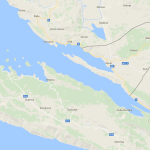There are those who say Bosnia should get a corridor through the Croatian sea to international waters.
As expected, it did not take long after the drama around the Croatian-Slovenian border dispute for other aspirants to try to claim parts of Croatian territory. The latest claim came from Bosnia and Herzegovina (BiH). After five years of relative calm in the territorial dispute, it is entirely possible that a new round of controversies over the land and sea borders between Croatia and Bosnia and Herzegovina is about to begin, reports Večernji List on 9 July 2017.
One day before the arrival of Croatian Prime Minister Andrej Plenković and his ministers to Sarajevo for a joint session with the Bosnian government, the House of Representatives of the BiH Parliament adopted conclusions which demand that Croatia should be sent a message to “suspend all activities related to the construction of the Pelješac Bridge until full mutual consent is achieved.”
The House of Representatives has ordered its government to submit a comprehensive and detailed report on activities related to the construction of the Pelješac Bridge, as well as all the documents related to the border dispute with Croatia. These conclusions were proposed by representatives of those Bosniak parties which traditionally describe Croatian policy towards Bosnia and Herzegovina as “imperial.”
As far as Croatia is concerned, its position is that there is nothing controversial with the decision to start the construction of the bridge which will connect two parts of the Croatian mainland. The construction is expected to start soon due to the 375 million euro grant from the European Commission, which confirms that the bridge is one of strategic EU projects.
Commenting on possible issues raised from the Bosnian side, Plenković said that “the bridge does not threaten the interests of Bosnia and Herzegovina.” However, unofficial sources say that Croatia has agreed to form a working group that will once again check if there are any problems. For Bosnia, this is probably the last chance to prevent the construction of the bridge, which some say represents “a dangerous trap for Bosnia.”
Such claims are mostly put forward by the somewhat obscure Maritime Society of Bosnia and Herzegovina. According to them, Bosnia as a maritime country has a right to have access to international waters. A member of the society Ibrahim Bušatlija demands that the access should be secured by “international court which would provide for a 1.5-mile wide corridor from Neum, between the islands of Brač, Hvar and Korčula, where Bosnia would have contact with the open sea.” This corridor would be some 70 km long. The construction of the Pelješac Bridge would end these dreams because, as they say, “it would be built over the Bosnian territory and cut our corridor into two parts,” so Bosnia would be left with just the inner sea, which it has now.
Such arguments should not be taken lightly because they had once already been harmful to the bridge construction project, whose cost had significantly increased when Croatia accepted the request from BiH and increased the height of the bridge from 35 to 55 metres and left 200 metres of passage between the central pillars of the bridge. Why? In order for large military ships, cruisers and large container ships which could in some distant future sail towards Neum, the only town on the Bosnian coast. In that undefined distant future, Bosnia would construct a major port in Neum and move the port infrastructure from the nearby Croatian port of Ploče.
The position of the BiH House of Representatives that “the sea border with Croatia should be negotiated on the basis of new principles” only confirms that Croatia will have to fight for its borders on multiple fronts at once.








